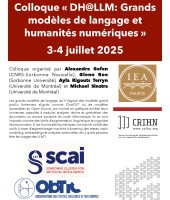DH@LLM: Grands modèles de langage et humanités numériques
Workshop organized by Glenn Roe (Sorbonne-Université), Alexandre Gefen (CNRS-Sorbonne Nouvelle), Ayla Rigouts Terryn (Université de Montréal) and Michael Sinatra (Université de Montréal), in partnership with the Paris IAS.
Event co-organized by IEA Paris, as part of the
PostGenAI@Paris project coordinated by Sorbonne Université, in partnership with the Bibliothèque nationale de France (BnF) and Sciences Po Paris.
Onsite event, open to the public with registration.
Registration: contact Floriane Chiffoleau (floriane.chiffoleau@hotmail.fr) and Mikhail Biriuchinskii (m.biriuchinskii@gmail.com).
Conferences in French and in English.
Presentation
In the space of just a few years, large-scale language models - from highly aligned mass-market models such as ChatGPT to Open Source models - have demonstrated their immense capacity to translate, analyze, rewrite and synthesize documents, and even produce computer code. They have established themselves as revolutionary tools for linguistic and cognitive augmentation. If the Digital Humanities have very early used machine learning-based tools (text clustering, topic modeling, embeddings and vector analysis, etc.), what can LLMs be used for? What old tasks can they accomplish, and what new types of analysis can they enable? Beyond their usefulness, for example, in identifying named entities, or in sentiment analysis, there's every reason to believe that they can enable new or greatly accelerated textual analyses. We might even go so far as to imagine that these tools may augur well for a way of making texts speak directly to each other in the form of questions and answers, opening up a whole new field of analysis. But what are also the biases of such practices, if we think of the problems of explicability and falsifiability posed by LLMs, which are liable to produce hallucinations. These are the horizons this symposium aims to open up, by welcoming both general reflections and innovative experiments.
Prorgram
9.30am - 9.45am: Welcome address by the organizers
9am45 - 10.45am: Care and Repair for Responsibility Practices in Artificial Intelligence
Plenary session by Geoffrey Rockwell
10.45am - 11.45am: Session 1 chaired by Alexandre Gefen
- Autopsie de l’auteur par l’IA générative : introspection, perpétuation de la persona auctoriale et nouvelles modalités créatives par le journal littéraire, la correspondance et les enregistrements numériques
By Jim Gabaret
- Les êtres humains peuvent-ils penser ?
By Marcello Vitali-Rosati
11.45am - 12.15pm: Break
12.15pm - 1.15pm: Session 2 chaired by Ayla Rigouts Terryn
- Comparaison de méthodologies d’apprentissage pour différents modèles de langue : implémenter la logique du verlan dans une machine
By Emile Provendier
- L’IA générative et la plateforme LaCAS pour la recherche en études aréales : apports et défis
By Liliane Hodieb, Bastien Sepulveda and Peter Stockinger
1.15pm - 2.15pm: Break
2.15pm - 3.15pm: Session 3 chaired by Michael Sinatra
- Comprendre sans trahir : quelles garanties pour les historiens face aux grands modèles de langue ?
By Marie Puren et Aurélien Pellet
- La fin de l’historien-programmeur ?
By Frédéric Clavert
3.15pm - 3.45pm: Break
3.45pm - 4.45pm: Session 4 chaired by Glenn Roe
- Explorer l’émergence de la science économique dans l’Encyclopédie grâce aux LLM : retours d’expérience sur l’Encycloscope 2.0
By Morgan Blangeois, Naïs Sabatier and Aurelia Vasile
- Du prompting au fine-tuning. Réflexions sur l’usage des LLM pour une édition numérique de la Bibliographie de la France (XIXe siècle)
By Elisa Courant and Jordi Brahamcha-Marin
Partners
- Observatoire des textes, des idées et des corpus (ObTIC)
- Centre de recherche interuniversitaire sur les humanités numériques (CRIHN)
- Huma-Num
|
|
|
|
|
|
